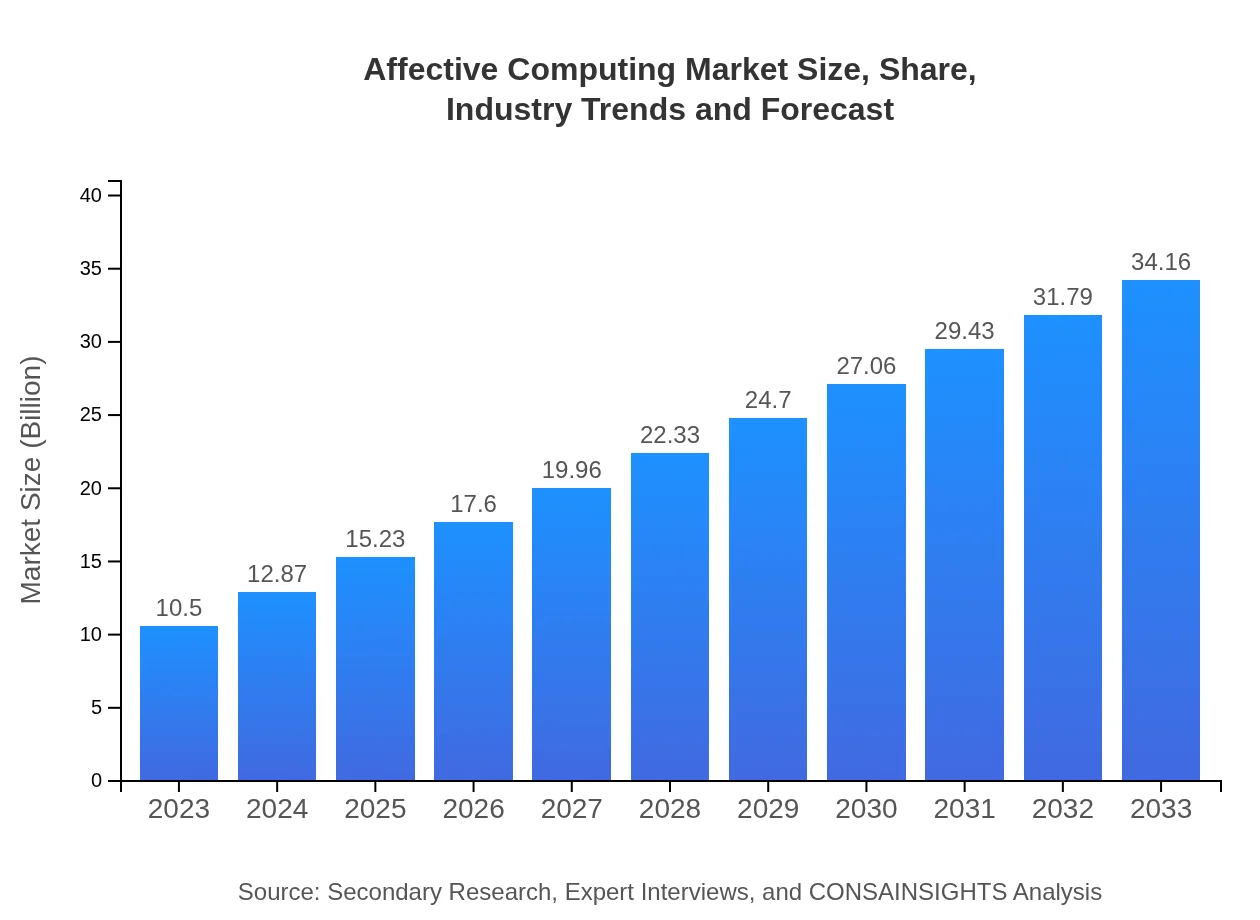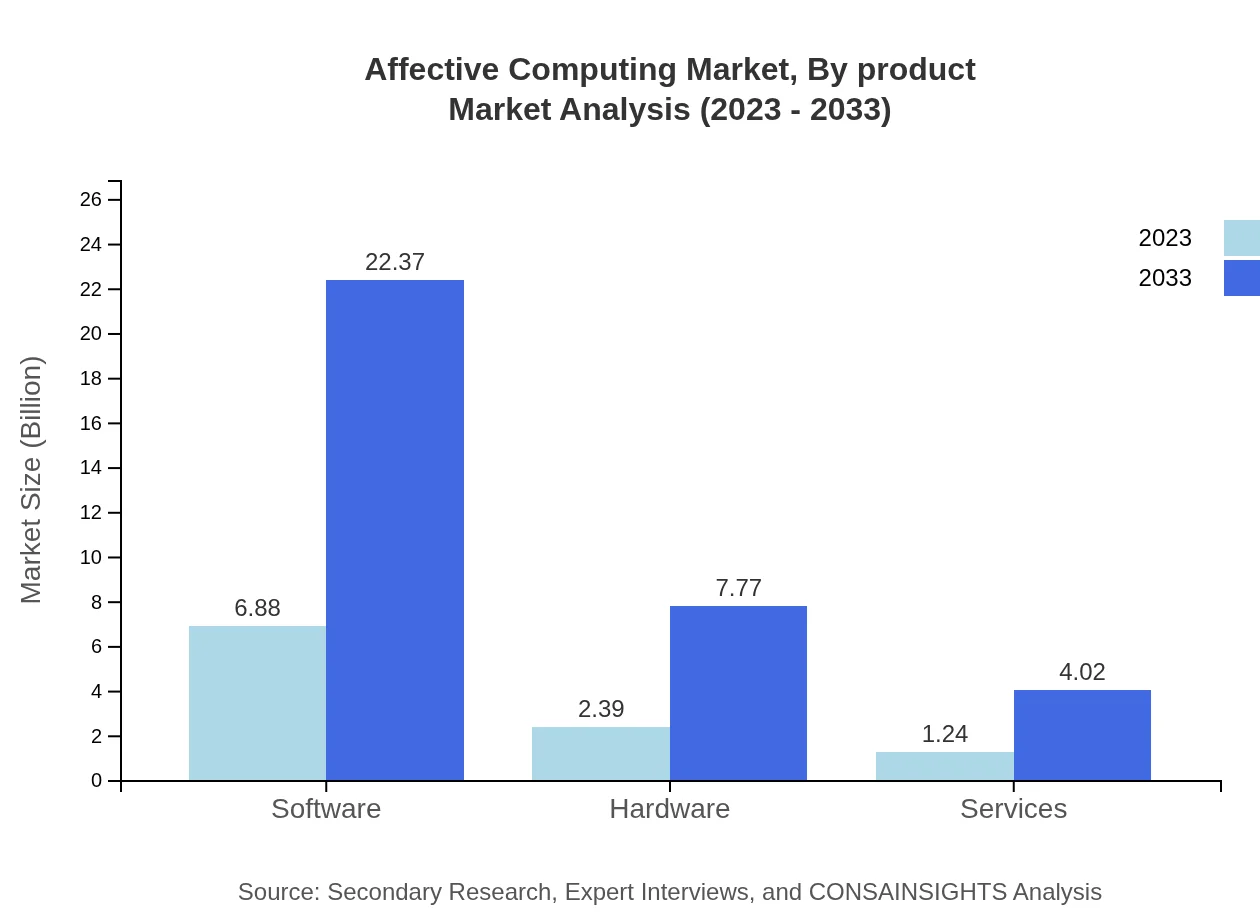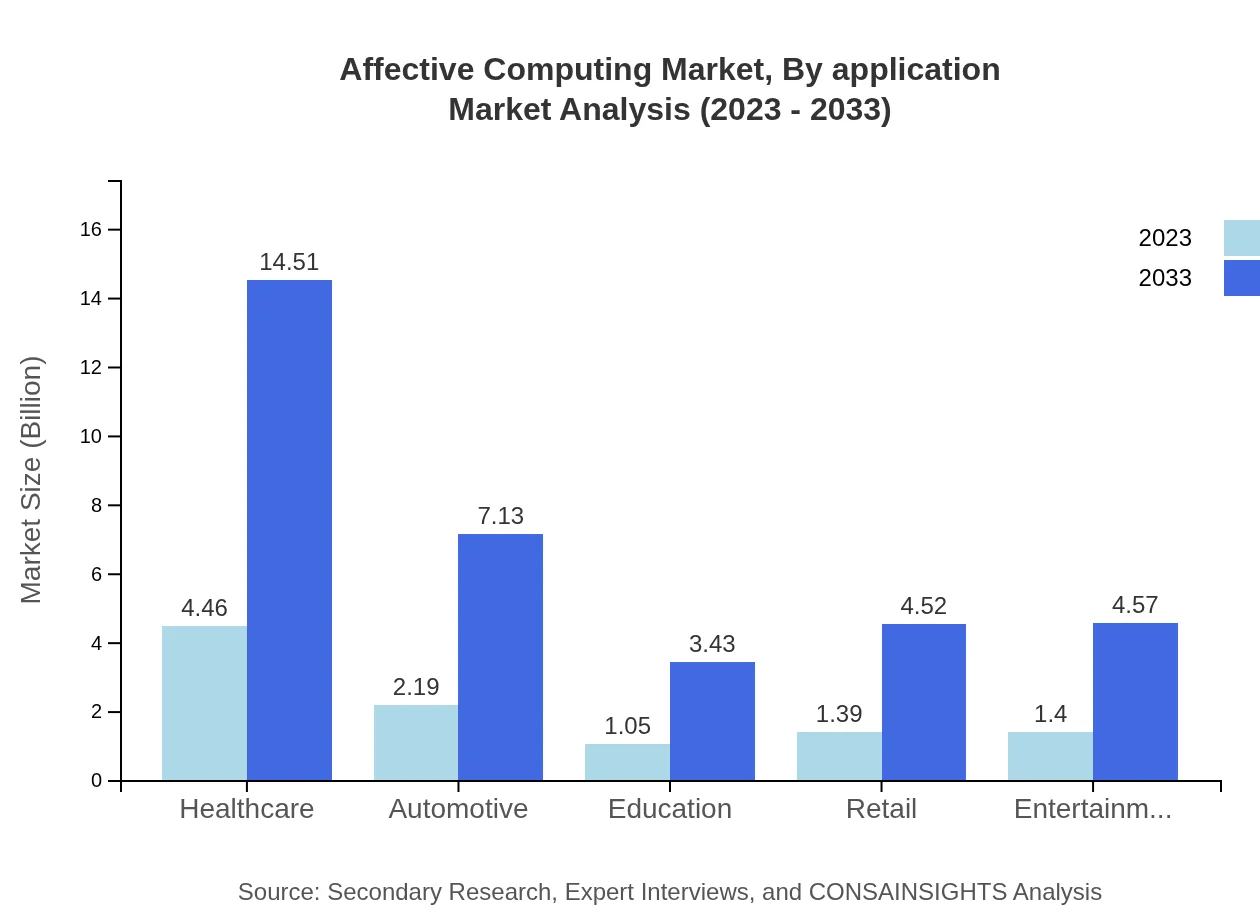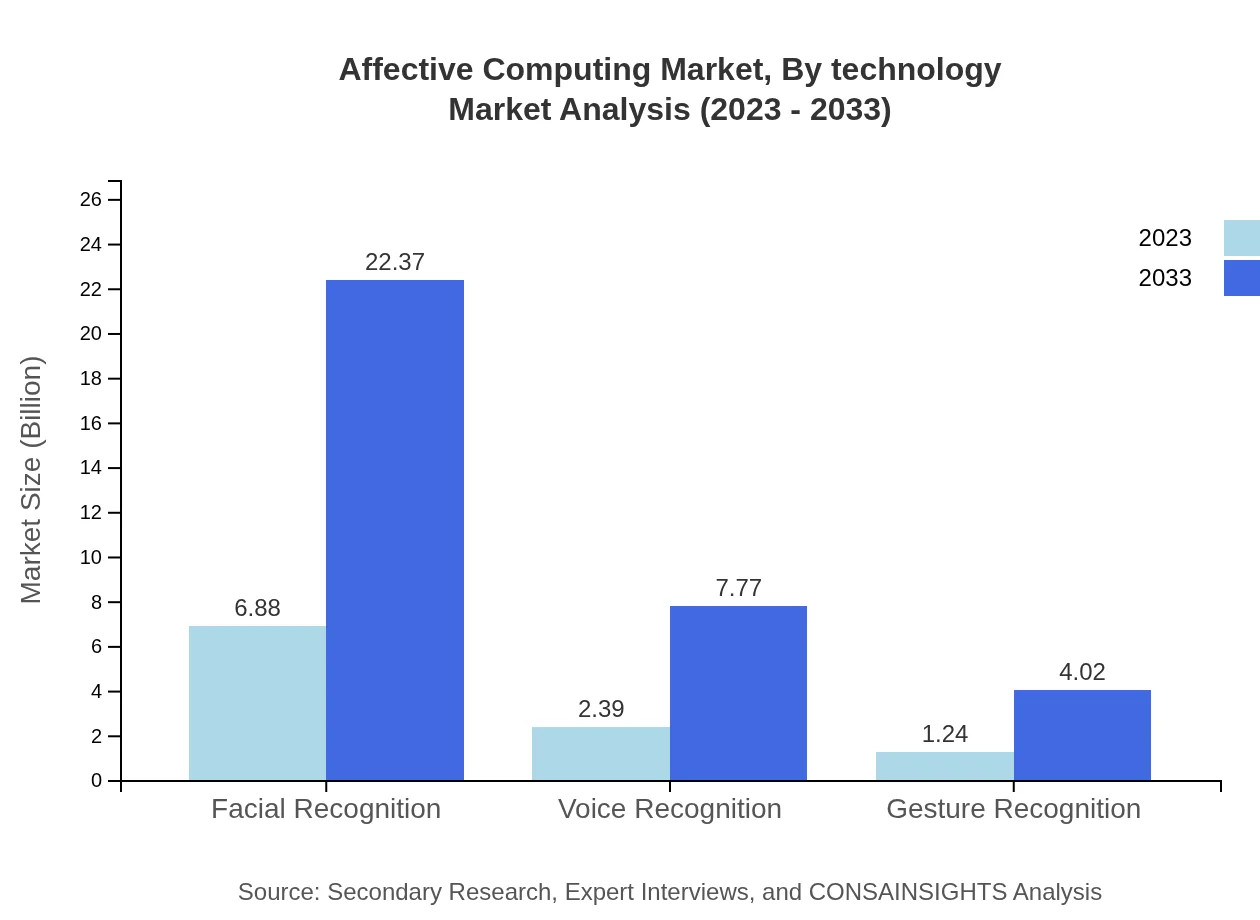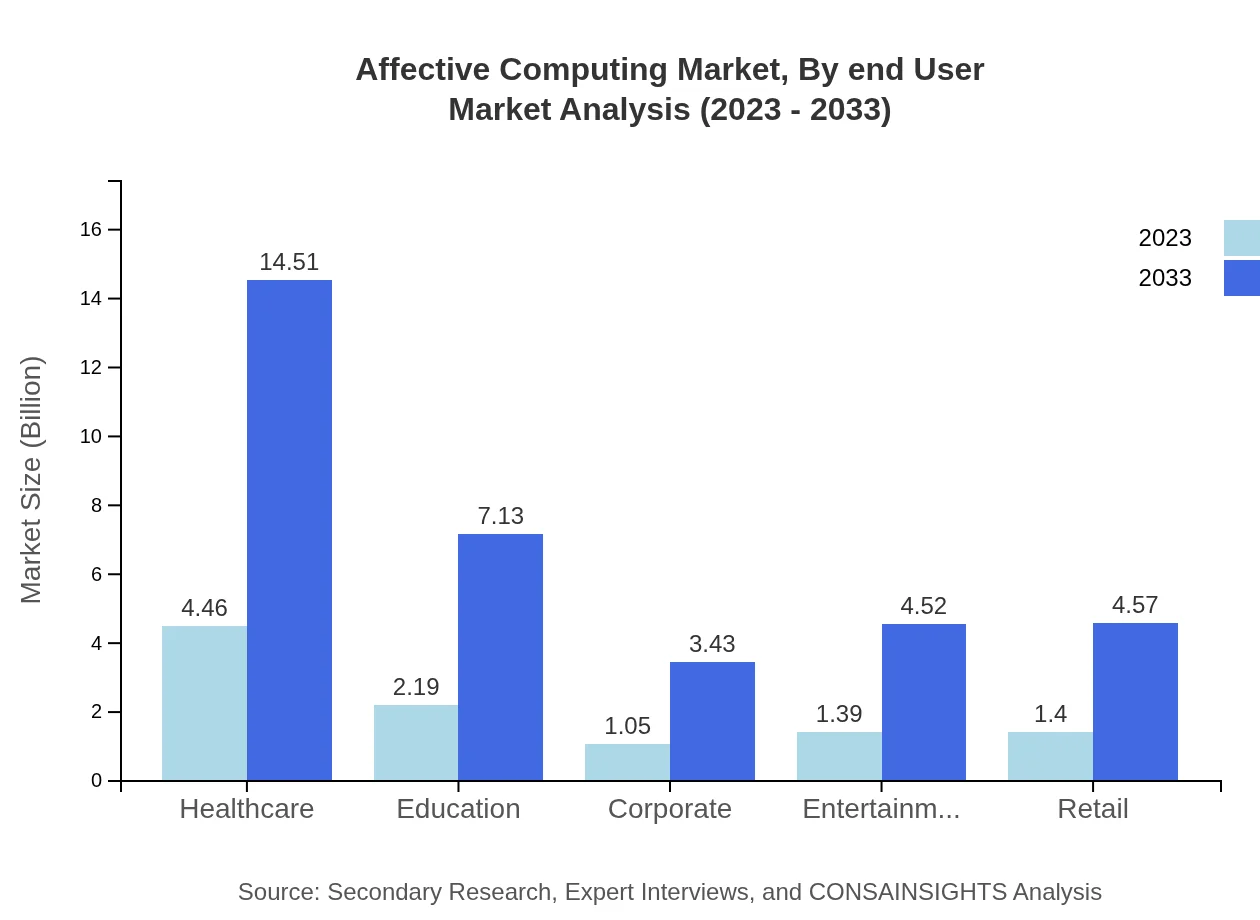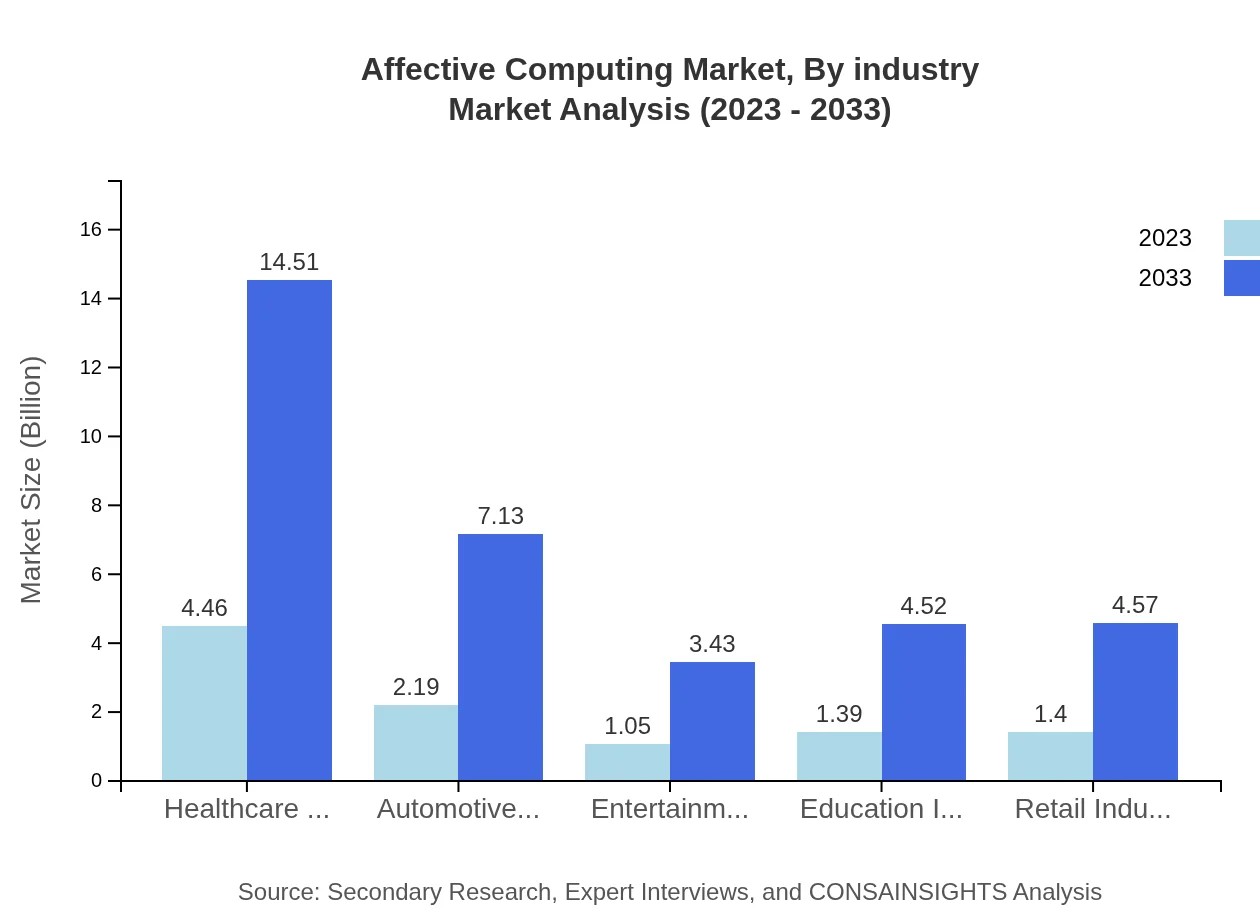Affective Computing Market Report
Published Date: 31 January 2026 | Report Code: affective-computing
Affective Computing Market Size, Share, Industry Trends and Forecast to 2033
This report provides an in-depth analysis of the Affective Computing market, detailing its growth prospects, regional breakdown, technological advancements, and industry leaders from 2023 to 2033.
| Metric | Value |
|---|---|
| Study Period | 2023 - 2033 |
| 2023 Market Size | $10.50 Billion |
| CAGR (2023-2033) | 12% |
| 2033 Market Size | $34.16 Billion |
| Top Companies | Microsoft Corporation, IBM Corporation, Apple Inc., Google LLC |
| Last Modified Date | 31 January 2026 |
Affective Computing Market Overview
Customize Affective Computing Market Report market research report
- ✔ Get in-depth analysis of Affective Computing market size, growth, and forecasts.
- ✔ Understand Affective Computing's regional dynamics and industry-specific trends.
- ✔ Identify potential applications, end-user demand, and growth segments in Affective Computing
What is the Market Size & CAGR of Affective Computing market in 2023?
Affective Computing Industry Analysis
Affective Computing Market Segmentation and Scope
Tell us your focus area and get a customized research report.
Affective Computing Market Analysis Report by Region
Europe Affective Computing Market Report:
The European Affective Computing market, valued at USD 3.38 billion in 2023 and expected to grow to USD 11.00 billion by 2033, is witnessing growth due to stringent regulations and initiatives promoting AI within the public and private sectors, particularly in the UK and Germany.Asia Pacific Affective Computing Market Report:
The Asia Pacific Affective Computing market, valued at USD 1.80 billion in 2023 and projected to reach USD 5.85 billion by 2033, is experiencing rapid growth, driven by an increase in internet penetration and mobile device usage. Key markets include China and India, where major investments in AI research and development are boosting the sector significantly.North America Affective Computing Market Report:
North America leads the Affective Computing market, valued at USD 3.77 billion in 2023 and projected to expand to USD 12.28 billion by 2033. The region's growth is fuelled by significant technological advancements and increased investments from companies focused on enhancing user experiences and emotional engagement processes.South America Affective Computing Market Report:
In South America, the Affective Computing market is expected to grow from USD 0.99 billion in 2023 to USD 3.23 billion by 2033. The growth is attributed to increasing digitalization and a rise in technology adoption across diverse sectors, particularly in Brazil and Argentina, emphasizing emotional data's importance in customer relations.Middle East & Africa Affective Computing Market Report:
The Middle East and Africa Affective Computing market, from USD 0.55 billion in 2023 to USD 1.80 billion by 2033, is slowly emerging with growth facilitated by advancements in AI technologies and increasing interest from educational and healthcare institutions looking to improve their services.Tell us your focus area and get a customized research report.
Affective Computing Market Analysis By Product
In 2023, the software segment is dominant, valued at USD 6.88 billion, projected to grow to USD 22.37 billion by 2033. The hardware segment follows with a 2023 valuation of USD 2.39 billion, expected to grow to USD 7.77 billion by 2033. Services, particularly in healthcare and education, also show substantial growth from USD 1.24 billion (2023) to USD 4.02 billion (2033).
Affective Computing Market Analysis By Application
Key applications of affective computing span across several domains, including education, healthcare, and entertainment. The healthcare sector represents a significant share, valued at USD 4.46 billion in 2023, and is projected to grow significantly as emotional recognition plays an increasing role in patient care and monitoring.
Affective Computing Market Analysis By Technology
Technologies such as facial recognition, voice recognition, and gesture recognition are instrumental in driving the market. The facial recognition sector alone is valued at USD 6.88 billion in 2023, expected to grow to USD 22.37 billion by 2033, while voice recognition also shows robust growth.
Affective Computing Market Analysis By End User
End-users span various industries, with significant contributions from automotive and retail sectors. The automotive industry alone is projected to increase from USD 2.19 billion in 2023 to USD 7.13 billion by 2033, highlighting the growing demand for emotionally aware vehicles.
Affective Computing Market Analysis By Industry
Industries such as healthcare, automotive, and education are prominent in the Affective Computing landscape. The healthcare industry commands a substantial market share of 42.47%, emphasizing the importance of emotional intelligence in patient care and therapy applications.
Affective Computing Market Trends and Future Forecast
Tell us your focus area and get a customized research report.
Global Market Leaders and Top Companies in Affective Computing Industry
Microsoft Corporation:
A leading player in AI and cloud computing, Microsoft has integrated affective computing technologies into its products to enhance user engagement.IBM Corporation:
IBM's Watson platform employs various emotional AI techniques to provide solutions for healthcare and customer service.Apple Inc.:
Known for its innovative consumer electronics, Apple utilizes affective computing to improve the functionality of its virtual assistants and user interfaces.Google LLC:
Google harnesses machine learning and AI to develop solutions that integrate affective computing in everyday applications, enhancing user interaction.We're grateful to work with incredible clients.









FAQs
What is the market size of Affective Computing?
The Affective Computing market is estimated to reach $10.5 billion by 2033, representing a substantial growth driven by its adoption as it demonstrates a CAGR of 12% from 2023 to 2033.
What are the key market players or companies in the Affective Computing industry?
Key players in the Affective Computing industry include leading tech giants specializing in AI and machine learning. They invest heavily in seamless integration of emotional recognition technologies across various applications, enhancing user interaction and experience.
What are the primary factors driving the growth in the Affective Computing industry?
Growth drivers in Affective Computing include increasing demand for emotion-aware applications, advancements in AI technologies, healthcare improvements through emotion detection, enhanced user experiences in retail, and the rise of smart automotive systems.
Which region is the fastest Growing in the Affective Computing market?
North America is currently the fastest-growing region in the Affective Computing market, expected to expand from $3.77 billion in 2023 to $12.28 billion by 2033, showcasing significant technological adoption and investment.
Does ConsaInsights provide customized market report data for the Affective Computing industry?
Yes, ConsaInsights offers tailored market report data for the Affective Computing industry, enabling companies to obtain specific insights and analytics based on their unique business needs and market dynamics.
What deliverables can I expect from this Affective Computing market research project?
Deliverables from the Affective Computing market research project include detailed market analysis reports, segmentation insights, competitive landscape assessments, growth forecasts, and tailored strategic recommendations for market entry or expansion.
What are the market trends of Affective Computing?
Current trends in Affective Computing include increased integration in healthcare for patient management, enhanced customer interactions in retail, emotional AI in educational applications, and advancements in facial, gesture, and voice recognition technologies.

